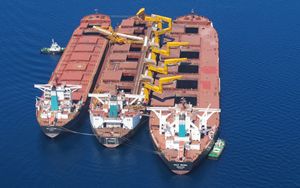(Finance) – The new ones tensions in the Red Sea are complicating the crisis in the Middle East, with reflected on global trade, which risk jeopardizing the economy and influencing the choices of central banks. Evidence of this is the surge in oil prices, which reacted to the latest skirmish between the US forces and the Houthi rebels. An issue which, according to some analysts, risks influencing inflation and interest rate policies.
The number of containers transported by ship across the Red Sea, according to estimates by the Kiel Institute, it is indeed slipped by 66% to 200 thousand containers per day from the approximately 500 thousand transported per day on average in January in the period 2017-2019. Clearly, due to the assaults in the Red Sea, the ships had to divert the routewith a notable lengthening of times (20 days of navigation instead of 7) and transportation costs.
Prices have skyrocketed
The change of direction has taken place increase freight rates of merchant ships, which reached the stars. The Kiel Institute also estimates that the transport of a standard 40-foot container from China to Northern Europe have exceeded $4,000 US, compared to around US$1,500 in November.
The Drewry’s World Container Indexan independent research and consultancy firm in the mercantile sector, noted yesterday 11 January 2024 reported a cost increased this week by 15% to $3,072. According to the consultancy firm, the freight would have recorded an average of one surge of 61% to $2,670 for rates relating to shipments of 40-foot units, compared to the previous survey dated December 21, 2023. I higher price increases on the boxes shipped from Asia to Europe and the Mediterranean: from Shanghai to Rotterdam +115% to 3,577 dollars, from Shanghai to Genoa +114% to 4,178 dollars. However, the increases relating to outgoing routes from China to the United States are also noteworthy: – Los Angeles +30% to 2,726 dollars Shanghai-New York +26% to 3,858 dollars.
A shock that can influence monetary policy?
The growing geopolitical tensions in the Middle East – underlines the management company Schroders – have begun to create disruption in supply chains global. This latest disruption follows the drought problems in the Panama Canal and the problems besetting Taiwan ahead of the elections.
All this risks creating new shocks to supply chains, as happened after the Covid-19 pandemic, and causing a new surge in inflationwhich would force the global central banks to aggressively raise rates of interest, at a stage in which we are thinking instead of reducing them.
What will really happen? According to Schroders experts, the repercussions of supply problems on inflation will depend on the duration of the current upheavals, but at least three important differences in the global economic context suggest that it is unlikely that the problems in the Red Sea lead to a rsignificant increase in inflation: weak global demand; the balance of consumption patterns between goods and services; the stability of supply which means that real shortages are unlikely.
A more immediate risk for global inflation – it is underlined – it would take over if tensions in the Middle East began to influence the supply of raw materials, in particular by increasing prices energy prices. If oil prices were to rise towards USD 120 per barrel, one simulation predicts that the global economy would move towards stagflation.
